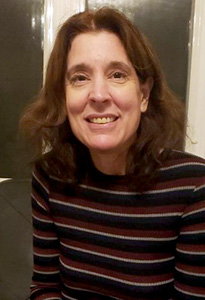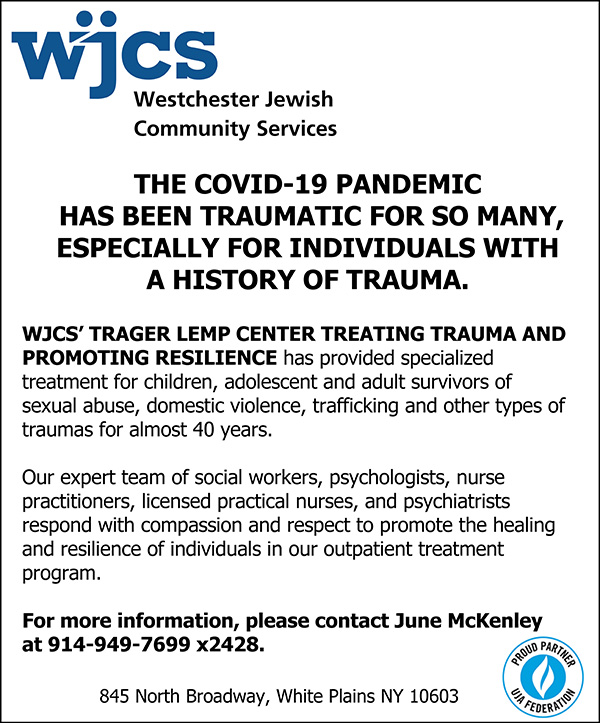It was mid-March 2020, and I, like so many others, will never forget how concerned I felt as I prepared to leave my office indefinitely to work from home due to the threat of COVID-19-19. It was a time when all of us were worried about our health and our futures, regardless of our circumstances. One of my coworkers asked if the Compeer program, which I oversee at Westchester Jewish Community Services (WJCS), one of the largest human service organizations in Westchester County, was over. Although I answered no, I was secretly afraid that it would be difficult or impossible to sustain the program from home, with little or no in-person contact between volunteers and the clients or between me and the volunteers and clients, and without any group events that are such an important component of the socialization process we facilitate.

Laura Stein, LMSW
Compeer Inc. is an international program that engages volunteers to provide one-on-one supportive friendships and mentoring to improve the quality of life for adults recovering from mental illness. For over 16 years, I have coordinated WJCS’s Compeer program and have consistently been delighted to see how an individual’s self-esteem and overall quality of life is improved by the friendships developed with our dedicated group of volunteers. When I recruit, interview, screen, and train volunteer candidates, I make it clear that it requires committing to visiting or calling their Compeer friend for a minimum of four hours a month for one year.
The goal of Compeer is to help offset the loneliness and isolation that accompany mental illness and to provide increased social interaction, positive role models, and access to educational and recreational activities in the community. At the start of the pandemic, it was not clear to me how I could continue to ensure that the program would be successful under these conditions.
Yet, shortly after beginning to work from home, I noticed a surprising thing was happening. I was receiving more inquiries from potential volunteers than ever before. Many people wanted to volunteer because they both wanted to help lonely people and decrease the loneliness that they, themselves, felt as a result of the pandemic. The inquiries were coming from all over the tri-state area, from men and women of all ages and backgrounds. Since volunteers and clients were temporarily connecting through phone and computer contact only, volunteers who lived relatively far from Westchester County were able to be matched with clients in the county. Some of my first new volunteers were accomplished, enthusiastic college students, one of whom referred several of her friends. I was able to match all of these college students with clients on the waitlist, two of whom were in their seventies. Both of these matches, with a male and female college student in the volunteer role, were successful despite the age differences. The older adults enjoyed having energetic and kind young people to converse with them.
I was also fortunate enough to be contacted by multiple retired mental health professionals and teachers who were interested in volunteering. One retired mental health professional took on two challenging clients and never failed to send me detailed monthly reports about her interactions with both clients. Another volunteer who had already been matched before the pandemic asked for and received a second client. He began meeting with both clients regularly in person when it was deemed relatively safe to do so. In fact, there are now numerous matches that are currently able to enjoy meeting in person again while still following COVID-19 safety precautions.
Before the pandemic, I had always interviewed and trained volunteers in person and had also conducted intake interviews with clients in person. Beginning in March 2020, I became increasingly comfortable doing interviews and training sessions over the phone and was pleasantly surprised by how willing people were to answer personal questions from someone they had never even met in person. Both clients and volunteers were also excellent, for the most part, about keeping me posted on their matches and bringing up any concerns or questions they had. Most volunteers who wanted to meet with a match in person were even willing to get fingerprinted despite COVID-19 concerns.
I was fortunate enough to receive my second dose of the COVID-19 vaccine in early February 2021, and later that month was asked to come back to the office one of the three days a week that I work. I was very pleased to have some time in the office again and to see some of my coworkers in person. Although I had been able to get work done from home, there were some things that were simply easier to do in an office with fewer distractions. I am allowed to offer group events again and believe that I will do so within a few months. In addition, I am, thankfully, about to schedule the first in-person interview and training session with a volunteer since before the pandemic. Although the volunteer lives in Queens and was told that everything could be done over the phone, she chose to make the trip and meet with me in person. Considering the isolation brought on by the pandemic, her wish is not surprising. I have been fortunate to be able to administer the Compeer program during the pandemic despite challenging circumstances and look forward to continuing to do so under easier conditions as we make our way out of the pandemic.
Laura Stein, LMSW, is Coordinator at the WJCS Compeer Program. To learn more about the Compeer program, please go to www.wjcs.com. To contact Ms. Stein, please write to lstein@wjcs.com.




